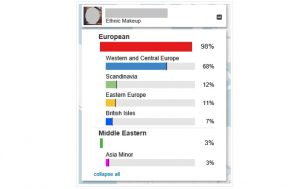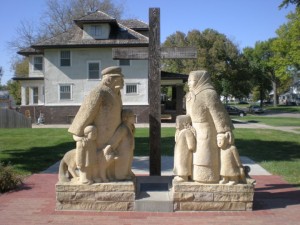Table of Contents
Leadership and social impact go hand in hand as businesses look to integrate corporate social responsibility (CSR) and environmental, social, and corporate governance (ESG). This aligns with continued business commitments to socially friendly initiatives such as the United Nations CSR dubbed the Global Impact, to which thousands of companies have already subscribed.
As a result, the primary responsibilities of CEOs have shifted from focusing solely on profits, but also to the well-being of the stakeholders and the community. There needs to be an aspect where you show empathy and an understanding of the business’s and society’s woes and also show the urge to address them.
- But how do you address them authentically and effectively?
- How do you genuinely create a social impact that reflects your values?
- How do you convince others to join you and work toward your mission?
The answer is in the values, traditions, and stories that shape your identity. The culture you inherited from your ancestors and the values you’re brought up with can offer valuable insights into how you can be a caring CEO.
For example, discovering a history of discrimination and stigma in your family can make you more inclined to implement inclusivity and equality policies in your company.
This guide delves into family heritage’s role in understanding social and environmental issues. It also offers tips on initiatives, such as social inclusion and climate change, that could align with your identity, values, and goals.
How To Find Personal Motivation for Enhanced Leadership and Social Impact
Warren Edward Buffett, Indra Nooyi, are examples of successful CEOs finding their personal motivation from their family history. Buffet appreciates the middle-class family he grew up in and his parents’ teachings about values of frugality and social responsibility.

Investor, philanthropist and Berkshire Hathaway co-founder, chairman and CEO, Warren Buffet appreciates the middle-class family he grew up in.
These principles have remained intact throughout Warren Buffet’s life, and his philanthropic efforts and have become essential to his legacy.
Comparatively, Indra Nooyi’s motivation is well documented in her memoir “My Life in Full: Work, Family, and Our Future.” Nooyi shares how her family values and cultural background shaped her leadership style.

Indra Nooyi’s family values and cultural background shaped her leadership style to become one of the world’s 100 most powerful women.
One particular lesson she learned was the respect for diversity. Nooyi elaborates on her commitment to bolstering inclusion and diversity during and after her tenure at PepsiCo.
These two examples top the list of successful CEOs who have leveraged their unique family heritage to make a difference in their professional areas. It also indicates that incorporating family values enhances your social impact as a leader and a company.
Your Family Heritage Can Offer The Much-Needed Personal Motivation
The best part about sourcing your motivation from your family heritage is that you benefit in many ways.
- You learn about your ancestors’ legacy and achievements, which helps you understand your own challenges, strengths, and identity better.
- You get to discover the complexity and diversity in your family tree, exposing you to perspectives that can enrich your empathy as a CEO.
- Your ancestors’ contributions come to light, and you recognize significant family roles in society or the environment.
- Your family’s struggles and challenges can help you develop a sense of gratitude and humility, likely fostering a spirit of service and generosity to the less fortunate.
- Most importantly, you’ll be sure to avoid any potential ethical dilemma or conflicts of interest likely to arise from unknown family ties.
- Family heritage is the best place to get your cue when you want to align your personality and professional goals with your family’s vision and values.
While the list could continue, the primary advantage is knowing where to look in your family history research. Luckily, expert genealogists at Record Click provide a comprehensive genealogy report highlighting critical sources of motivation such as:
1. Contribution To Population Growth, Cultural Diversity, And Demographic Changes

Records and letters in a library
The birth, marriage, and death records are the primary documents for a genealogist. They help verify any information regarding population growth, cultural diversity, and demographic changes. Genealogist track actual birth names and dates and ancestors’ contributions in their communities.
It is the easiest way to find out if your ancestors were refugees, immigrants, first settlers, or intermarried across ethnicity, religion, or social background.
2. Contribution to Military Service

Your ancestors’ contribution as servicemen can be inspiring
Genealogists also get hold of military records to trace ancestors in the armed forces, the wars they fought, their honors, and their impact on the family. Nothing can be more motivating than learning about your ancestors’ contribution to the freedoms you enjoy today and the loyalty and leadership they demonstrated.
3. Land Utilization

Surveys, deeds and document related to land are helpful for genealogy researchers
Information on the possessions associated with your family can help understand its values and commitment to infrastructure, urban planning, and environmental sustainability. Luckily, genealogists have a broad access to land records showing, among other things, the properties your ancestors rented, owned, or sold.
4. Economic Activities and Contributions

census records like one seen here are crucial in learning about the demographic profile.
Census records help a genealogist locate ancestors in specific places and times and also learn about their education, household composition, economic status, and immigration history. The information in a census record can help you understand how your ancestors contributed to leadership and social impact initiatives. It is the best place to find out whether your ancestors were activists, teachers, farmers, artisans, etc.
5. Wealth They Left Behind
In-depth genealogy research also extracts Wills and probate records to define the ancestors’ estate, the debts they incurred, and the beneficiaries. The Will can also convey the testator’s true intentions and wishes, especially regarding social justice and philanthropy. An indication that your ancestors contributed enormously towards education, health, human rights, and non-profit organizations can clarify their values and how you can promote them in your position.
How To Gain Deeper Insights Into Social And Environmental Issues
Family history and values can also help C-suite executives gain deeper insights into social and environmental issues. With a comprehensive genealogy report from RecordClick, you get anecdotes about some of the most pressing CEO challenges like inequality, social justice, climate, diversity, and conservation.
1. Inequality and Social Justice

Leaders looking to enhance their social impact must promote social justice.
Discovering the social upheavals that ancestors endured can be a powerful motivator for C-suite executives to address issues of injustice in their organizations. As a CEO, you can drive policy changes, foster community engagement, and promote advocacy.
2. Cultural Sensitivity and Diversity

Cultural Ethnicity Calculator
Genealogy also uncovers the cultural diversity and diverse origins that shape your family. It involves tools like the cultural ethnicity calculator that may easily prove that you originate from a diverse background, motivating you to foster inclusivity as a CEO.
Standard practices to champion inclusivity as a CEO include creating employee resource groups, enhancing training programs, and diversifying leadership.
3. Climate Change Awareness
Genealogy can reveal how ancestors managed floods, their experience with drought, and whether their businesses contributed to pollution during the Industrial Revolution. As a CEO, such awareness could serve as inspiration to support energy initiatives such as reducing your company’s carbon footprint.
4. Historical Precedents

Historical events are an eye opener for contemporary challenges. Photo courtesy of the American Historical Society of Germans from Russia; Lincoln, Nebraska
Historical precedents with grave consequences on your family tree can also motivate you to merge your leadership with social impact. Learning that your great-grandfather was involved in the Civil Rights Movement can make you more attuned to the importance of diversity and inclusion within their company.
With all the details and documents provided to you by our genealogist, you can find the need to implement policies to support underrepresented communities and promote equal opportunities. Your ancestor’s precautions throughout the Industrial Revolution should inform you of their industrial excesses. Such lessons help you take the necessary steps to maintain environmentally sustainable and ethical practices in your company.
5. Legacy of Philanthropy

Companies make donations as part of their alignment of corporate culture with family ethics
The legacy of philanthropy in American families is a testament to generational values’ impact on social responsibility. As a CEO, you want to know what philanthropic practices your ancestors participated in and at what magnitude, especially if you’re running a family business.
For example, the Rockefeller family is famous for supporting social causes like arts and health. As a modern CEO discovering such a lineage, you might be inspired to establish a drive that aligns with those values.
You can learn a lot from your family history, especially if you want to be remembered as a socially responsible CEO. By uncovering your ancestors’ values, trials, and triumphs, you can find wisdom and inspiration to face contemporary social challenges.
Actionable Steps For CEOs To Bolster Leadership and Social Impact
Below are the actionable steps you can take across departments to foster social responsibility;
1. Reflect on the Family Values and Legacy

Family members and relatives can offer insights into their ethics
Understanding your family heritage makes it easy to identify the enduring principles that keep it strong and how you can align that with CSR goals. You can align principles like integrity, respect for people, and community involvement with modern CSR goals and impact stakeholders and the community in the long run.
2. Identify Historical Parallels
The discovery of having lost ancestors or relatives in the Triangle Shirtwaist Factory Fire in your family history research can be an unfortunate reminder of the need for caring as a CEO. From poor working conditions to a lack of safety measures, you can learn a myriad of lessons to address today’s challenges.
The examples from your family history can be unique and hence have unique lessons that could save the contemporary corporate world. You only need to take actionable steps like fostering inclusivity and partnering with the community.
3. Leverage Ancestral Wisdom

family history requires accurate genealogy and documentation
Your family history comes with crucial insights about your ancestors’ adaptability, resilience, and ethical conduct. Some of the effective ways these insights can help you include:
- Fostering a Resilient Mindset: You can use your ancestors’ problem-solving techniques to deal with setbacks and stress and promote your well-being.
- Adapting to Different Situations: Create a diverse team open to changing business models and strategies based on evolving needs.
- Promote Ethical Conduct: Set clear policies to reflect fairness and integrity in all dealings.
- Enhance Family Heritage: Understand the company’s cultural roots and align the corporate culture with family ethics.
4. Engage with the Community
Positive engagement involves collaboration, listening to people’s needs, and actively participating in community life. Typical engagements may include regular meetings, supporting essential services, and launching collaborative initiatives.
5. Build a Legacy of Responsibility

Enhancing generational transition also fosters social impact
Seek to build a legacy of responsibility and care as you foster leadership and social impact. Consider how future generations will judge you and how you want to inspire them in your family and beyond.
Below are crucial steps for a CEO to leave a long-lasting legacy:
- Define Core Values: Embed core values such as community service or sustainability in the corporate culture and communicate them clearly to all stakeholders.
- Lead by Example: Use your decisions and actions to demonstrate the environment you wish to create and serve as a role model.
- Invest in People: Employee development is a crucial step in leadership and social impact as it prepares the workforce for the future.
- Open Engagement Channels: Maintain open communication with employees, customers, and the community and show empathy, especially when making far-reaching decisions.
- Plan for Succession: Developing a succession plan ensures the company’s legacy and values are upheld now and in the future.
The steps you take as a CEO to boost your social impact and leadership will mostly depend on your identity and personal narrative. Whatever your strategies, you will surely enhance your reputation and credibility as a CEO who cares.
Enhance CEO Reputation And Credibility

LG CEO William Cho has actively engaged with company employees through end -of-year F.U.N. Talk’
Besides your efforts’ corporate and social impact, your reputation and credibility as a CEO who cares can only soar. Here’s how:
1. Public Relation
Leaders engaging in enhanced leadership and social impact are often considered more respectable and trustworthy. Studies suggest that the reflective leadership model, known to foster awareness of social impact and ethics, is associated with increased stakeholder loyalty and trust.
Leaders, including Bill & Melinda Gates and Sheryl Sandberg, have demonstrated their dedication to societal well-being through their foundations. As a result, they have positively influenced their image and earned respect from the public.
2. Unique and Authentic Brand Identity
Your commitment to enhancing leadership and social impact creates a unique and authentic brand identity, especially when informed by family heritage. Family-owned businesses like Ford Motor Company and Walmart have mastered using family history and values to their advantage. Their unique stories give their brand a human touch and foster customer connection.

Ford Motor Company leverages family history to boost its brand
In the same way, your family history and determination to impact society can be a robust differentiation in a competitive market. Traditions and history can help you create a unique brand and stand out among competitors. Such an approach builds loyalty and trust among customers.
Be A Socially Responsible Leader
Working on social impact and responsibility enhances a leader’s reputation and credibility, not to mention its positive impact on the community and society. Luckily, family history research can provide clues about the issues that haunt the community and your ancestors’ efforts toward them.
CEOs also have lessons to take from their heritage on how to be authentic, practical, and inspiring leaders.
With Record Click, you can hire a genealogist to help you study your background and identify critical aspects of your family and life that convey authentic and motivational personal narratives.
Record Click offers a wide array of genealogy services and a diverse genealogy team that is Accredited, Credentialed, Professional, and Experienced to break open your family tree and reveal your unique family history.
A genealogy company shouldn’t only be about local searching; that’s why our diverse team includes specialists from all across the United States and across the globe. Regardless of whether your ancestral background is from Australia, the United Kingdom, Canada, or other parts of the globe, we can help you break open your family tree.
Our expertise is record retrieval! You can ask our researchers about your ancestors worldwide, geographical migrations, marriages, affairs of the heart, medical family tree, death records, land deeds, assets, and much more.
We can customize your family search for the genealogical research you need, your time frame, and your budget. We offer free consultation and an automatic discount for all new customers.
Contact us today or schedule a call.
RELATED:
How Personal Narratives Make You An Effective CEO







